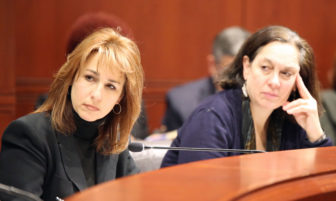State officials and parent advocates gave different versions Tuesday of how often, and why, the Department of Children and Families (DCF) takes custody of children with severe behavioral health problems – and whether the practice should continue.
Advocates, including a group of adoptive parents, told the legislature’s Committee on Children that a proposed bill that would prohibit DCF from “requesting, recommending or requiring” that parents relinquish their custodial rights when seeking mental health treatment for their children is needed to stop a practice known as ‘trading custody for care.’ The bill, drafted by state Rep. Rosa Rebimbas, R-Naugatuck, was prompted by an October C-HIT story that described DCF’s use of “uncared for” custody petitions against parents who could not manage their children at home and insisted on specialized residential care.
In testimony Tuesday, DCF Commissioner Joette Katz said the agency resorts to taking over custody only in rare cases in which parents refuse to take their children home from inpatient settings or “will not cooperate” with clinician-recommended in-home or community-based treatment services.

Christine Stuart Photo.
DCF Deputy Commissioner Kristina Stevens and DCF Commissioner Joette Katz testify at hearing before the Committee on Children.
“We disagree with the notion that DCF requires parents to completely relinquish custody of their children” to receive suitable behavioral health care, Katz said. She acknowledged that the agency has sharply reduced the number of children it places in residential treatment.
Maureen O’Neill-Davis, leader of a parents’ group called Family Forward Advocacy CT that is lobbying for the proposed bill, said parents seeking intensive residential care should not have to give up rights to their children. She and other parents described being told by DCF and court workers that the only way to access specialized out-of-home care was to relinquish custody. Most of the parents said they had exhausted in-home services provided through DCF and were left on their own to manage children who were a threat to the safety of siblings and other family members.
“We don’t want to give up our children,” said O’Neill-Davis, of Torrington. “(But) we are told that if you forfeit custody, they will get your child the care they need.”
O’Neill-Davis said DCF has a responsibility to provide high-level mental health care to unstable children that should remain separate from its role as a child-protection agency. The parents’ group has alleged that financial considerations are prompting the custody-for-care pressure, as DCF reduces funding for children not legally in its care and limits residential placements. DCF officials have denied that funding plays any role.
DCF has said that “uncared for/specialized needs” petitions removing parents’ custody are used only as a last resort, in cases where parents cannot provide appropriate care for their children.
Judicial department data show the state has used the petitions to take custody of more than 860 children over five years – or an average of three children a week.
Steven Hernandez, executive director of the Connecticut Commission on Women, Children and Seniors, said the agency has heard from parents who have been “coerced into giving up their parental rights” in order to secure residential mental health care. He urged the committee not to buy into “mythologies” that difficult parents were to blame.
“Sometimes it is expedient to have a family that is asking too many questions out of the way” of decision-making, he said. “There are many causes that could lead down that expedient road.”
Several parents who support the proposed bill said a key problem underlying the custody issue is that DCF’s in-home treatment services are not sufficient to help severely troubled children. Tracy E. Schulz, a retired state Capitol police officer from Manchester, said she and her husband were unable to access appropriate services for their grandson through DCF’s Voluntary Services program, which provides mental health services. The program offered “many meetings that were fruitless, visits to our home that were unnecessary, as our grandson was in a sub-acute care facility, and no offer of services that we were asking for,” she said.

Christine Stuart Photo.
Rep. Diana Urban, committee co-chair.
Katz said DCF provides an array of mental health services to thousands of children not in state custody and is abiding by “national best practices” in relying on in-home and community-based care. The department approves facility-based care for a “small number of children” in the Voluntary Services program, she said.
DCF lawyer Barbara Clare insisted that the agency would never require parents to fully terminate their parental rights in order to secure care. She said the custody issue was usually triggered by parents, who, “because of their own issues… they simply want the child put someplace and not to come home until they’re fixed. . . That’s not how treatment works,” she added.
Custody only comes into play in a “tiny, tiny percentage of cases where there is disagreement” over whether the child needs outpatient or residential treatment, she said.
State Child Advocate Sarah Eagan said her office supports the proposed bill as a way to prevent the filing of custody petitions “due solely to the child’s specialized mental health or disability support needs.” She noted that state law specifically provides that “commitment to… (DCF) shall not be a condition for receipt of services or benefits” from the agency.
“It is imperative that state systems do not inadvertently require children and families to submit to juvenile court proceedings where there are no concerns of parental unfitness or medical neglect,” Eagan said. “Urgent solutions need to be found so that parents can appropriately access needed mental health and developmental support services.”
State Rep. Noreen Kokoruda, R-Durham, said she was concerned that connecting custody to care, in any way, would “deter people who really do need help, but don’t want to give up custody of their children.”
Samantha’s Law
https://en.m.wikipedia.org/wiki/Samantha's_Law
Samantha’s Law is unique to the Province of Alberta, part of a Canadian Child Protection Act. Samantha Lauren Martin was born June 4, 1993 and died December 3, 2006. The circumstances of her life and death prompted legislative amendment for persons with disability. Samantha Martin was born with Tetrasomy 18p, a rare chromosome syndrome, resulting in global developmental delays, Autism and a Seizure disorder. In 2009 the House of Commons tabled the United Nations Convention on the Rights of Persons with Disabilities recognizing December 3 as International Day of Persons with Disability.
Background Edit
Samantha Martin was in the custody of the Canadian government. She lived in a foster care facility in Alberta, Canada. On December 3, 2006, Samantha died at age 13 while a patient at Stollery Children’s Hospital.
Samantha Martin was in the custody of the Canadian government. She lived in a foster care facility in Alberta, Canada. On December 3, 2006, Samantha died at age 13 while a patient at Stollery Children’s Hospital.[citation needed]
The Family Support for Children with Disabilities Program,[1] delivered through the Family Support for Children with Disabilities Act[2] and accompanying Regulation,[3] recognizes children with special needs as legally distinct from children in protective services under the intervention model. Government funding under that program is made available to families directly in order to prevent the need for guardianship relinquishment and out-of-home placement to achieve necessary medical supports.
The Family Support for Children with Disabilities (FSCD) program is not connected with Child Intervention Services. Both programs, however, fall under Alberta Human Services, FSCD is a distinct program with separate legislation.[4]
Upon Samantha Martin’s medical prognosis, Government Representatives instructed the family that custody must be surrendered in order to gain access to funding for necessary medical services. Tragically, Samantha Martin was not provided the supports promised and died. The Program representing children with disabilities under authority of Section 106 of the Child Welfare Act was in place until 2004. Samantha’s mother, Velvet Martin, further led a Family-Centred Care initiative to amend Policy in honour of persons with disability and their families. Persistence resulted in the establishment of “Samantha’s Law” known as Section 2-3 of Family Supports for Children with Disability (FSCD) of the Child, Youth and Family Enhancement Act (CYFA). Section 2-3 of FSCD Policy was retroactive to December 2006 marking Samantha Martin’s death. Policy and Procedures in Family Centred Supports and Services: “The Family Support for Children with Disabilities Program to have separate legislation from that of child protection services.”
The premise behind Samantha’s Law is promotion of equality, honour of human rights and dignity. In the absence of abuse of neglect, loving families tasked with extraordinary developmental or medical diversity must not be grouped amongst the Child Intervention Model. Rather, families are to be supported directly with in-home supports; not be coerced into relinquishing custody – whether temporary or permanent – in effort to secure Government funding for required services.
References and external links Edit
^ “Family Support for Children with Disabilities (FSCD) website”.
^ “Alberta Queen’s Printer, FSCD Act”.
^ “Alberta Queen’s Printer, FSCD Regulation”.
^ “Family Support for Children with Disabilities (FSCD) FAQ”.
[1] [2]